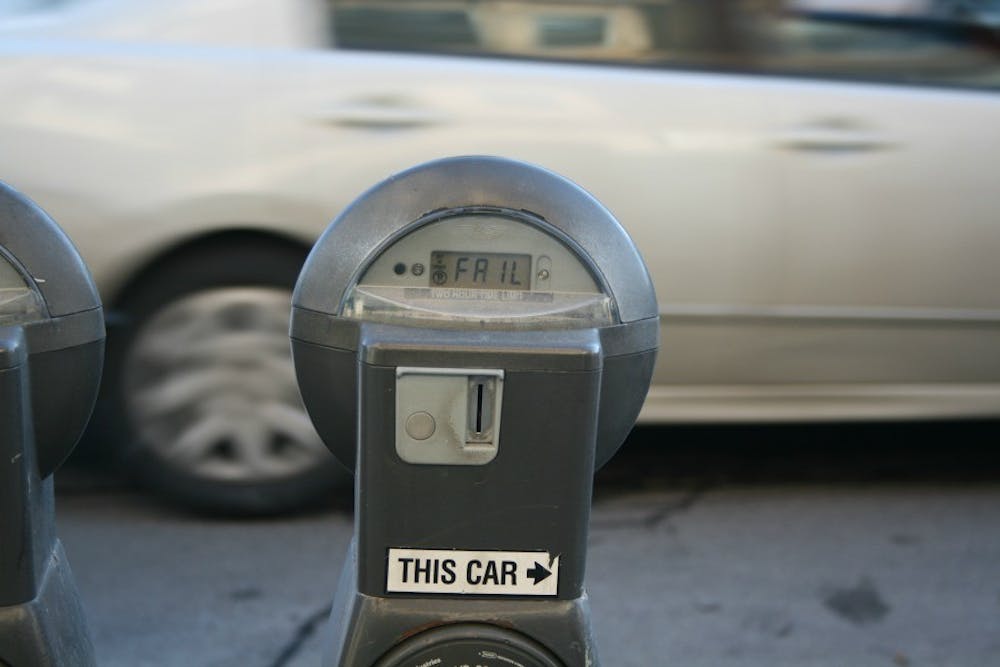By Alison Treen, Staff Writer
As residence halls are renovated and new construction is built, prices are already on the rise in multiple aspects on campus. Starting in July of this year, parking will also follow the trend. Parking prices will increase in July 2015 and again in 2016, according to Miami University Parking Ordinance O2014-6, which was approved in June 2014.
The price of parking permits for faculty and staff currently stands at $30 per year, regardless of parking location. Beginning in July, the price of the permit will depend on location of parking.
Proximal parking includes campus streets and parking lots; remote parking refers to Ditmer, west Millett, and Culinary Support Center parking lots, according to the ordinance.
"In the past we'd only differentiated between remote and proximal [parking] for students. Now we're doing the same for faculty and staff," said Lt. Benjamin Spilman, director of Parking and Transportation Services.
Proximal permit prices will rise to $75 in July and then to $125 the following year for faculty and staff, while remote parking permits will remain at no cost.
Students currently pay $220 for annual blue permit passes (or proximal parking); beginning in July, this will increase to $250 and in the 2016-2017 school year to $300, according to the ordinance.
"I think it's ridiculous," said junior Thomas Educato. "The price of parking permits was already too high, and I think it's absurd that on-campus meters are already four times as expensive as off-campus."
The increase in permit prices is mainly a result of space concerns, money deficit and sustainability incentives on campus, according to the original proposal, which was drafted in November 2013. Parking garages cost around $20,000 to build and the annual cost to construct, operate and maintain them totals $1,500 per space per year.
"Parking services is not a money-maker for the university," Spilman said, and noted that Parking and Transportation Services falls about half a million dollars short every year. "We want the system to become closer to self-sufficient so general fund dollars don't have to go towards maintaining parking facilities."
Increased parking prices is one way the university is trying to deter people from bringing their cars to campus each day, but the ordinance also addresses a new carpool incentive for faculty and staff. Carpools with three or more drivers (all who register for one permit pass that can be moved to different vehicles) will pay $30 for both the 2016 and 2017 fiscal years. Carpools with three or more drivers will get a permit with no charge.
Another difference with the price increases will be the manner in which permits are paid. While in the past, faculty and staff permits were paid through a one-time $30 payroll deduction, permit fees will now be paid through a monthly payroll deduction. Students will still be charged to their bursar accounts.
"One thing we were really sensitive to was that $75 for some of the employees here could be a substantial hit to a paycheck," Spilman said. "The biggest percent change goes to the faculty and staff, but the dollar amounts are still relatively small."
Compared to other public Ohio universities, Miami's current parking prices are among the lowest, according to the ordinance. Miami students pay $110 to $220 for two semesters of parking, while students of Cleveland State University pay $360 to $474. Miami faculty and staff currently pay an annual $30, while faculty and staff permits at Cleveland State University cost anywhere from $799 to $992 annually.
However parking violations at Miami are high compared to other Ohio universities. A $75 parking violation at Miami is the equivalent to a $25 fee at Cleveland State University.
While Miami has chosen to subsidize maintenance costs in the past, according to Spilman, the university is now looking to reduce subsidization needs by generating more revenue from parking. Student, faculty and staff parking are among the most directly affected, but community members and visitors will now be charged as well.
"That's a big change for Miami. In the past we've always provided parking on campus in the most convenient locations to our visitors at no cost," said Spilman.
In fact, in 2014, approximately 5,300 visitor-parking permits were issued at no cost, according to the proposal. With the new changes, these permits will now come with a price tag. Daily permits will be $3; weekly will be $10; and monthly will be $35.
Community members who use the Rec Center will have the choice of purchasing a parking pass, parking on Campus Ave. and using city meters, or parking in the Campus Avenue Parking Garage where they will be able to park for free to up to an hour and a half, according to Spilman. Drivers will have to pay the difference over the hour and a half limit, at 50 cents per hour over.
As predicted by the ordinance, the increase in parking fees is not a popular change.
Ruth Sanders, professor emerita of German and Rec Center regular, said she believed the new policy would have a negative effect on the Rec Center if members don't opt to park in the lots and have to pay the visitor pass fee.
"The Rec Center itself could be hurt economically," Sanders said. "[Personal trainers] would start losing clients if older people don't come, and I think it would end up shrinking back the Rec Center programs."
Yet Spilman said the change was necessary and a long time coming.
"This wasn't something that just came up; this is something that's been planned for a long time now," he said. "We recognize that raising fees has an impact on people and we're trying to mitigate those effects. We're also trying to put the responsibility for those costs where they belong, and that's with the users of that system."

